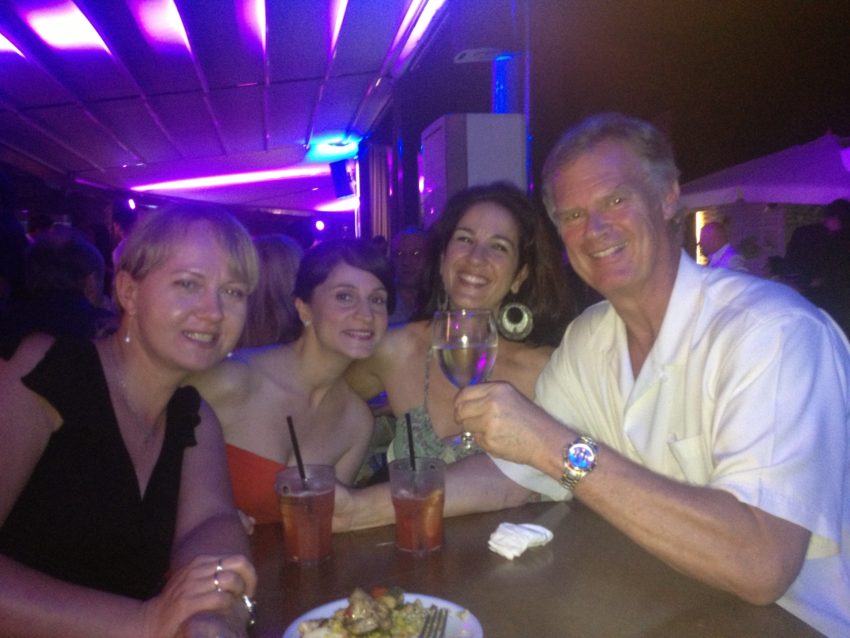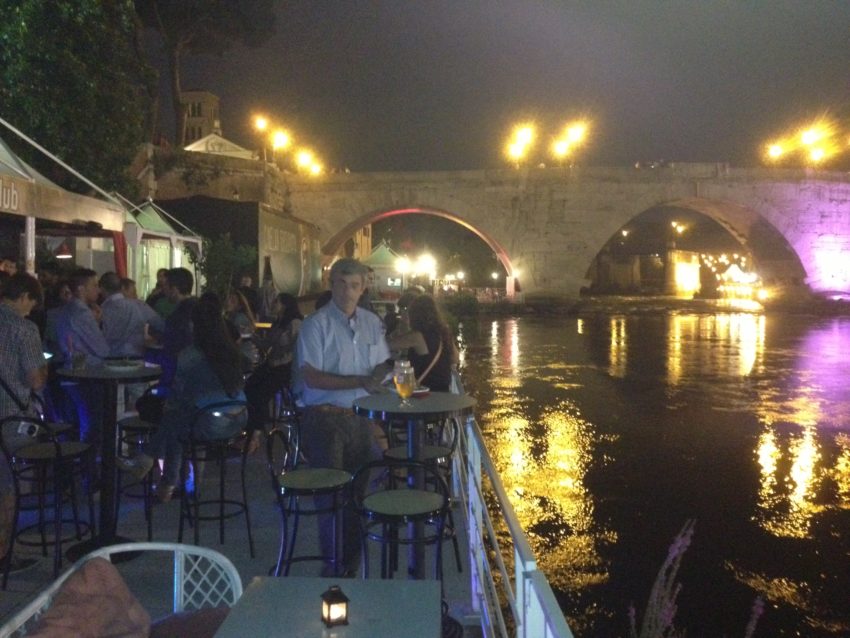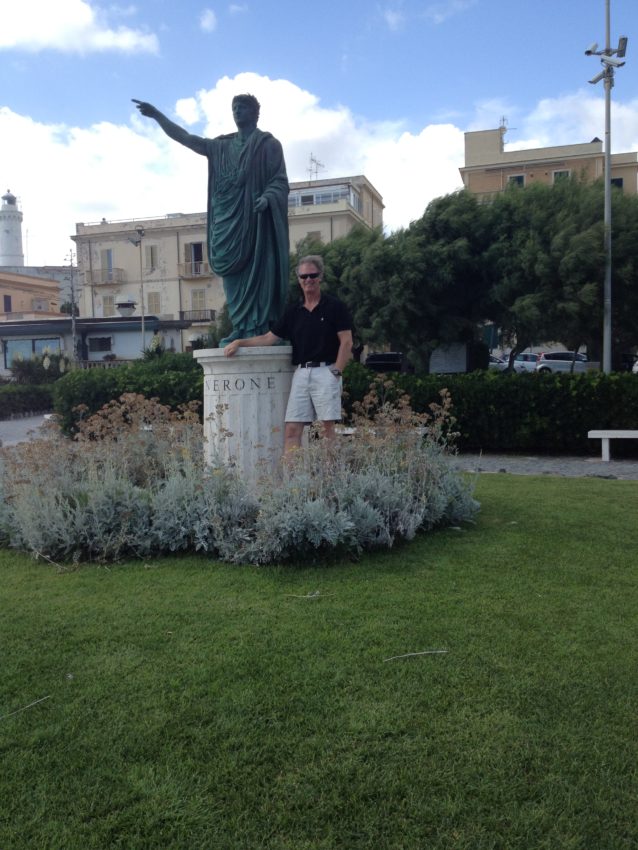Retired in Rome Journal: Six-month anniversary marks a lot of learning about my favorite city on earth



JULY 11
Six months ago today I arrived in Rome with the rest of my life encased in a duffel bag, a backpack and a roller bag. I left behind a 40-year journalism career, a condo with a spectacular view of the Rocky Mountains and all the comforts sought by the embattled Italians I was about to join. I had no regrets. I still have none. Retiring to Rome was one of the greatest decisions of my life, right up there with moving here the first time.
After six months, la dolce vita is sweeter than I ever imagined it would be. My mind has expanded as well as my circle of friends and, occasionally, thanks to an extraordinary stock market, so has my retirement account. I have a beautiful penthouse apartment with a gorgeous terrace view of the Tiber River. New clothes from one of Rome’s biannual sales fill my walk-in closet.
But those are mere material pleasures. Talking about Rome in terms of material goods is like describing the woman of your dreams by discussing only her bust size. I once wrote that living in Rome for a year and leaving is like having the greatest weekend of your life with the best woman you’ve ever met and spending the rest of your life looking for that woman again.
I found her.
The love affair has continued and it’s more intense than ever. Sure, we have rough patches. Waiting a month for Internet tried my patience. Waiting an hour for a bus that never bothers to show up is maddening. But I wake up to birds chirping outside my window. The sun sets on Gianicolo hill across the river from my terrace. Every day I cook great meals from some of the freshest, most flavorful food in the world. Look, I live in an outdoor museum, for God’s sake. Even if you’re not into art you can appreciate walking past a backlit Roman Forum that was the center of the universe 2,000 years ago.
The only thing battered in my life is my Collins Italian-English dictionary. You can barely read the “Collins.” In fact, you can barely tell it was once blue. The color has faded into growing splotches of white from my fingerprints constantly grasping it to search for the word I don’t know or the spelling of one I do know.
More of the Italian language is only one of the things I’ve learned in my six months in Rome. And, like life in Italy, I’ll never know it completely. But as the brilliant sun shines through my window onto this corner writer’s nook, let me write all the things I have learned in my six months retired in Rome:
* Testaccio is the greatest neighborhood in Rome. OK, I’ve got caught up in civic pride. Families have been living in this working-class “quartiere” south of the Forum for generations and there’s no place we’d rather be. There is no more pure Roman neighborhood. It has no hotels. It has no English. You have to really hunt for a postcard. The only tourists occasionally wander into my Mercato Testaccio on guided tours of true Roman cuisine such as tripe (inside lining of a sheep’s stomach), vaccinara (meat of an oxtail) and pajata (ringed intestine of an unweaned calf). It has one of Rome’s prettiest, tree-lined, shaded piazzas where the elderly and young alike gather on benches to read newspapers, gossip and flirt. I’m on a first-name basis with everyone from my butcher to my dry cleaner. I don’t recall ever hearing a name from a cashier at KingSoopers.
* The versatility of pesto. It’s my new peanut butter. I put it on everything. Bread. Chicken. Every kind of pasta. Romans gasp that I slather it on browned, chopped chicken breasts — “You invented this yourself, right? — but I don’t care. The smell of this crushed pine-nut puree itself is enough to make me immediately boil a pot of water, like Pavlov’s dog on command. And much to people’s chagrin, I don’t make it from scratch. The fresh pasta in my market is as perfect as gelato.
* Expats aren’t bad. I know. I am one. I arrived in Rome six months ago with the notion that I would stick with Italians. I needed it for culturization. I needed it for language. I was going to be a reverse expat snob. I wasn’t going to speak English unless my life was threatened. However, in a city as metropolitan as Rome, to isolate yourself from other foreigners you’d have to lock yourself in a closet or in a neighborhood butcher shop selling tripe and pajata. It’s not possible. I joined a terrific Meetup group called Expats Living in Rome. They have meetings nearly every Tuesday all around town. We’ve had aperitivos on Isola Tiburina, dances in the tony OS Club and World Cup watch parties. I’ve met fascinating people from Poland, Turkey, Mexico, even Gibraltar.
But you have to know to whom you’re talking.
Tuesday night I went to the Meetup to watch the Germany-Brazil World Cup semifinal. After Germany crucified Brazil, 7-1, I met a couple of fellow expats and we started talking about the game. I went on a rant.
“DO YOU REALIZE NOT ONE OF THOSE BRAZILIAN PLAYERS WILL EVER HAVE SEX AGAIN? EVER! HOW? WHAT SELF-RESPECTING WOMAN WOULD EVER BE SEEN IN PUBLIC WITH PLAYERS WHO LOOKED THAT AWFUL. THEY HAVE ALL LOST THEIR MANHOOD. GERMANY TOOK IT AWAY TONIGHT! THEY WILL FOREVER BE FLACCID!!!”
One problem: They were Muslims. Oops! He had some royalty connection in Jordan and the woman, an absolute goddess who looked like some queen’s daughter, was from Syria. The guy looked at me as if I had just sacrificed a goat on his living room carpet. The woman, however, was howling, trying to hide her face from showing her friend she thought it was funny. I doubt she’s ever been in a conversation where the word “flaccid” ever came up.
* Day trips from Rome are endless. I’ve visited too many little towns to count but each one has its own reason for visiting. Viterbo (thermal baths and the best gnocchi in Italy), Porto Ercole (Caravaggio’s place of death), San Gimignano (world’s tallest skyline for a little town), Calcata (a village of 55 people hanging precariously over a cliff), Borgorose (speck of a town and jumping off point for incredible hiking in rural Lazio). Yesterday I went to Ostia, home to a stretch of boring beach frowned upon by Romans and tourists alike. But the town itself is clean and bright with a big, open piazza and billowing trees covering the traffic-free streets with shade. As I did in my first stint here, I want to put up a map of Italy and throw a felt pen at it. Whatever town it hits, I’m going to visit. I’m sure I’ll enjoy it — unless I throw high and it hits Milan.
* How to build furniture. If my gym across the river is my second home, Ikea is my third. It’s the place to buy anything and everything for your home at reasonable prices. I bought a dining room table, four matching chairs and lounge chair, plus red cushions for all and a matching red umbrella. My 350-square-foot terrace now resembles a spa. After the gym and lunch I’d lay on my lanais chair, sunning myself while reading Corriere dello Sport. I haven’t suntanned on a roof since my fraternity days when we were slinging water balloons at the Sigma Nu house.
* The Tiber is beautiful — at night. During the day it’s the color of a Marine’s uniform after four days fighting gun battles in the desert. There are enough white plastic bags stuck in trees along the banks to outfit grocery stores in every suburb in America. But at night, when the 19th century lanterns along my Lungotevere illuminate the waters, it is only a little disgusting. Actually, after a couple glasses of wine, it resembles the Seine in Paris. At my end of Rome, the Tiber is as tranquil as a country stream. It moves slowly, like my Testaccio neighborhood. Around Isola Tiburina, the island in the middle of the river near Centro Storico, water cascades down drop offs all around you. It would look like a good place for white-water kayaking if falling in didn’t put you at risk to 1,000 rat urine-related diseases.
* You must eat Italian bread within about, oh, 30 seconds. Otherwise, it’s as hard as an iron bar. Italians don’t eat sliced loaves of bread. My local grocery store doesn’t even carry it. Romans buy it from public markets when they’re made that morning, every day for that day. Unlike its French cousins, Italian bread has a hard crust with a rich, soft dough inside. However, the joy of eating fresh Italian bread dollopped with a tomato sausage sauce is offset by waiting until the afternoon and finding you need a gladiator’s ax to cut it. For sandwiches, I order “panne latte,” simple white bread buns you slice down the middle. Loaves of bread are bought in the morning for lunch — or in the evening to help ward off a foreign invasion.
* Romans are unhappy. A big question I get from Romans is what’s the biggest difference I’ve found in Rome between my life here and my first stint from 2001-03. I look them straight in the eye and ask them a simple question: “Sei felice?” (Are you happy?) Most don’t hesitate. No, they’re not.
I’ve often written that Italians have a tremendous ability to not worry about things for which they can’t control. Salaries. Political turmoil. Bureaucratic mazes. More than 11 years ago, it all rolled off their backs like so much olive oil. They had their friends, their wine, their two weeks August vacation in Sardinia. Why worry? Today, 13 years after the introduction of the euro, more than a decade of runaway inflation and sedentary salaries have taken their toll. Life here is real hard. Romans are having a tough time making ends meet and it goes double for the young where underemployment is nearing 50 percent. Housing prices have made Rome one of the most expensive cities in Europe. Suddenly, they’re no longer laughing warm nights away over a bottle of wine in a piazza. They can no longer afford the bottle of wine. Forget two weeks in Sardinia.
As a result, Rome has changed. On Sundays 11 years ago, businesses were closed. Families gathered for big feasts then went on passaggiatas (strolls) around their neighborhood. I often saw neighbors roaming through St. Peter’s Square with nothing to do and nowhere to go. Today nearly everything is open on Sundays. Merchants can no longer afford to take a day off. Rome’s day of rest has become a day of quiet desperation. I have wholeheartedly bought into the learned statement from a photographer friend of mine who told me, “John, Rome is a great place to live if you don’t have to work.”
* The Italian term for “shrinkage.” I’ve taken two dips in the sea since moving here and each one reminded me of ill-advised swims in the Pacific Ocean near my childhood home in Oregon. In Australia’s ocean you fear sharks; in Oregon’s you fear sterility. One swim in Italy was in the Gulf of Liguria along the Cinque Terre in May and the other was Wednesday in Nettuno about 70 minutes south of Rome. It’s July and the water is absolutely bone chilling — still. I love cold water — in my glass and in my sea. But this water here is startling. I went in once Wednesday — ONCE! — and immediately recalled the term, “Si e’ restritto” (It shrunk).
On that note, I must run. I have the rest of my life to live.


July 13, 2014 @ 9:11 am
I’ve been enjoying reading this, following along with your reinsertion into Italy. My wife and I are moving to Rome toward the end of October, from Mexico City — work moves, foreign service — and will be living on the other side of the river from where you are, in Trastevere. We’ll be there at least 3 years. We should meet.
July 13, 2014 @ 10:46 am
Sure, Donigan. I would love to meet you and your wife. You’ll love Trastevere. For now, let me know how life is in Mexico City. Is it as violent as I hear? Write me at johnhenrome@hotmail.com. Once in Italy, you can call me at 347-898-3667.
John
July 14, 2014 @ 5:42 pm
Enjoyed your reflections, John. I have been noticing, as you mentioned, that you are mainly associating with ex-pats. Hope you do meet and make some Italian friends soon. Your Meet Up group does sound great, though. Our reservations are all set for Rome, September 23, departing September 27. We are 700 meters from the Colosseum and I think the Cavour station is nearby.
July 15, 2014 @ 4:18 am
I don’t know where you got the idea I’m associating mainly with expats. I have some expat friends but most of my associations are with Italians. I just haven’t had a reason to write about them much. I should be around when you’re here. You’re in a great area. In fact, Rome’s first wine bar is on Cavour near the Metro stop.
July 29, 2014 @ 4:07 am
I don’t really think that Testaccio is “off the beaten path” anymore – it’s been discovered by (some) tourists and guidebook writers alike. Give it 10 years and a good scrub… it’ll become just like Trastevere.